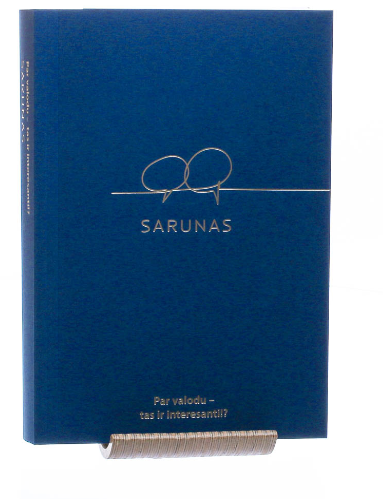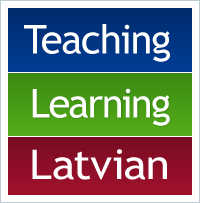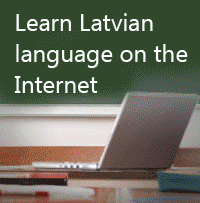We’ve published a book “Par valodu — tas ir interesanti?!” (“On language — is it interesting?!”)
The book includes transcripts of several public discussions that were held in 2018 and 2019 as part of a series of  public events titled “Evenings with language”, organized by the Latvian Language Agency. The discussions were moderated by journalists Sandra Kropa, Elvis Jansons, Paula Gulbinska and Jānis Krops, who spoke with several linguists, looking for answers to the question: “On language — is it interesting?!”
public events titled “Evenings with language”, organized by the Latvian Language Agency. The discussions were moderated by journalists Sandra Kropa, Elvis Jansons, Paula Gulbinska and Jānis Krops, who spoke with several linguists, looking for answers to the question: “On language — is it interesting?!”
Each conversation had its own subtitle or motto and focused on a field of linguistics such as computational linguistics, sociolinguistics, history of language, phonetics, onomastics, dialectology, translation science, and others.
We hope the transcripts of these conversations that we have published in this book will seem as interesting on paper as they did live.
Author and editor of the book — Anna Frīdenberga.
Photographer — Juris Bērziņš-Soms.
Cover and layout design — Baiba Lazdiņa.
Introductory words by the editor Anna Friedenberg: “Public discussions on literature, translation, and texts have now become a traditional form of events organized by the Latvian Language Agency. This time we have published fourteen conversations with linguists and language specialists. The discussions “Par valodu – tas ir interesanti?!” had two seasons and were held at “Birojnīca” on Thursday evenings. –The first season — the first seven conversations — were moderated by journalist Elvis Jansons, who began the first discussion about language by addressing the state of language in the digital age. He spoke with computational linguists Andrejs Vasiļjevs and Normunds Grūzītis. The second discussion was titled “Language in society. Are we heading in the same direction?”. The guests were linguists Ina Druviete and Vija Požarnova, researchers in the field of sociolinguistics. The third discussion — “Language through time” – addressed the history of language and the development of the Latvian language throughout the centuries, guest speakers — linguists Pēteris Vanags and Baiba Kangare. The title of the fourth discussion was “The sound of language”, and we invited specialists in the field of phonetics Ilze Auziņa and Juris Grigorjevs to shed some light on the matter. The fifth discussion “Do we understand the language of children?” — the moderator Elvis Jansons sought an answer to this question by speaking with linguists Dace Markus and Anna Vulāne. The sixth discussion dealt with “The Latvian language in the European language family” and featured guest speakers Ilze Rūmniece, a specialist in classical languages, and Jānis Sīlis, a translational researcher. The title of the seventh discussion was short and direct — “The Baltic languages”. Who knows more about Latvian and Lithuanian than the experts of both languages Laimute Balode and Edmunds Trumpa! In the second season of these events the moderator of the previous season, Elvis Jansons, passed the microphone over to his colleague Sandra Kropa. She moderated five of the conversations, while the remaining two were moderated by journalists Jānis Krops and Paula Gulbinska. The eighth conversation, moderated by Sandra Kropa, was titled “On Places and Words”. Representing the field of onomastics were the linguists Sanda Rapa and geographer Vita Strautniece, who fell for language because of her obsession with placenames. The ninth conversation “On words and their study” — a seemingly simple topic that nonetheless deals with difficult terms such as morphology and grammar, linguists Gunta Smiltniece and Andra Kalnača were there to provide insights. The tenth discussion “Regional variants of language” — journalist Jānis Krops and linguists Anna Stafecka and Vilma Šaudiņa delved into the issues of dialectology. The eleventh conversation was titled “Language in Translation”, and this time Sandra Kropa spoke to a single guest — the linguist Andrejs Veisbergs, who spoke about his experience working as a translator and interpreter. The twelfth conversation “How to teach and learn a language?” — linguists Diāna Laiveniece and Normunds Dzintars talk about language teaching and learning methods and share their experience about working as teachers. In the thirteenth conversation “This is how they speak in regional communities” was moderated by Paula Gulbinska, who spoke with linguists Benita Laumane and Ieva Ozola. The guests drew particular attention to the language of Lower Courland. And the fourteenth conversation “On the order of language. Order in language”. The topic of this concluding discussion was syntax — a topic whose experts are linguists Ilze Lokmane and Baiba Saulīte.
The areas of linguistics and issues covered in these discussions is very wide. Although the attendees of these discussions were often colleagues of the speakers, who were quite familiar with linguistics and what this profession entails, we hope that the discussions and this book will reach a wider audience and broaden your notions of these fields and language in general. The book sheds some light on what linguists study, what sources they use in their research, and what makes language research different today. Another interesting aspect worth noting was the view of the journalists moderating the discussions, especially their take on what it means to study language. In everyday conversation, language research is often compared to detective work.
Paula Gulbinska: “The linguist’s job is like detective work, when you try to find the root of something.” The linguist Jānis Sīlis compares the research process to the work of a detective and an archaeologist, explaining that a linguist “goes back to the very beginnings […] and takes part in archaeological excavations, uncovering the many layers of language development.” Ieva Ozola shares this view, saying: “We’re like archaeologists. […] We have to use the little we find to imagine what the building and space of language looks like.” Speaking about the process of translation, Andrejs Veisbergs had these words to say: “Working with words is like sports, it’s much like a game of chess.”
These conversations may also dispel a few myths about language and linguists in general, such as the notion that linguists judge the use of language only by whether it is used correctly or incorrectly.
The guests and moderators will receive a copy of the book by mail.
The book can be purchased at the Latvian Language Agency and in bookstores.



